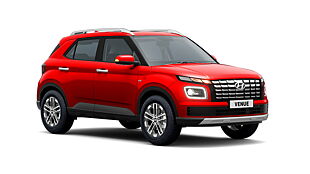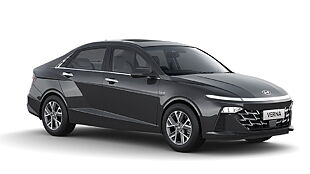What is it?
Why should I buy it?
Refined and frugal diesel engine, segment-first features, strong market value
Why should I avoid it?
Quirky styling, not a driver’s car
What is it?

Few cars in India have managed to establish themselves as a brand. The Hyundai Creta did it with its first generation itself when it unprecedentedly ruled the roost of the mid-size SUV segment. And now there is a new one. What we have here is the diesel manual derivative of the new-gen Hyundai Creta which is priced between Rs 9.99 and 15.8 lakh (ex-showroom). We have also driven the new turbo-petrol version and you can read about it over here.

In terms of appearance, the polarising styling of the new Creta surely divides opinion. But look at it long enough and the design starts to grow on you. The split headlamps and taillamps are Hyundai’s new global design language and so is the cascading grille. It isn’t as conventional-looking as the older Creta but manages to grab attention. Some of the striking elements like the floating roof, split-DRLs, character lines on the side, and quirky-looking rear make the new Creta standout even amongst its rivals. Similarly, the 17-inch multi-spoke alloy wheels gel well with the car’s eccentric styling. Dimension wise, the new Creta is slightly longer, wider and sits lower than the outgoing model and this is evident in its stance. Overall, the new Creta carries a global design and the appearance isn’t a deal-breaker at all, as some may have come to believe.

How is it one the inside?

What catches attention the moment you sit inside is the quality and fit and finish of the utterly modern cabin. We liked the rather wide 10.25-inch touchscreen infotainment system dominating the centre console; and the new Audi A6-esque steering wheel design. Hyundai has done a good job of making the cabin feel upmarket with the use of beige and black combination and aluminium inserts all around. Undoubtedly, the Creta’s cabin is a nice place to be in. However, we think, the use of soft-touch materials on the dashboard and door panels would have elevated the experience further.

If we were to nit-pick, the simple-looking controls for the air-con and use of hard plastic around the cabin feel tacky. And if you want to stow away your knick-knacks, there’s ample space for that all around. Talking about the compact steering wheel, it feels nice to hold and the buttons on it feel tactile too. Meanwhile, the digital screen behind the steering wheel is flanked by analogue needles on either side. This screen is large and easy to read. However, despite being a segment-first feature, it isn’t well executed with its animated interface and tawdry feel.

As for the seats, they are comfortable and offer ample under-thigh and lateral support. Both the front seats get cooled function and the driver’s seat gets an electric adjustment too. The visibility on offer is fairly good thanks to the relatively slim A-pillars and wide windscreen. The use of light-coloured materials also makes the cabin feel airy. Adding to this roomy feel is the massive panoramic sunroof. Meanwhile, the back seat offers generous head and legroom with a comfortable seating posture. They also get a correct recline and contours allowing the passenger to spend longer hours in the backbench. On the flip side, there could have been more thigh support and the shoulder room is a bit of a squeeze for three.

As for the boot space, it can easily gulp in a large-sized suitcase along with a couple of medium-sized suitcases leaving some space for backpacks and duffle bags. What’s more, the cargo space is fairly usable and the loading lip isn’t too high either easing the effort to place in heavy luggage. Being a Hyundai, the new Creta also packs in a long list of features. These features include auto headlamps, powered mirrors, all-four discs, Bose sound system, smartphone connectivity, TPMS, ambient lighting, wireless charging, integrated air purifier, and BlueLink connectivity to name a few.

How does it drive?

With the new-gen Creta, Hyundai has replaced the older 1.6-litre diesel with a new BS6-compliant 1.5-litre U2 CRDi mated either to a six-speed manual or a six-speed automatic transmission. What we have here is the manual derivative with a power output of 113bhp available at 4000rpm and 250Nm accessible from 1500rpm (down from 128bhp/260Nm of the 1.6).

Upon cranking up, the diesel settles into a refined hum with very little vibrations felt inside the cabin. Getting off the line, there’s ample grunt from the moment you let go off the clutch. Also, unlike the older Creta – which had an inherent spongy clutch action – the clutch here is smooth to operate. On the move, there is a slight turbo lag around 1800-2000rpm but beyond that, the engine feels linear. There's a surge of power from 2000rpm when the turbo starts to spool up and it stays there till 4500rpm redline. But despite a good level of insulation, the engine sound starts filtering inside the cabin at this point. But it isn’t that rough clatter you’d expect from a diesel and is bearable.

If you keep it in the meaty mid-range, there’s no need to constantly work through the gearbox, even when plodding through urban traffic. Even out on the highway, the relaxed nature of the engine allows the rev counter to sit around 2000rpm mark when doing highway speeds. And for quick overtakes, a strong mid-range does the trick as you only need to feather the throttle to get going. Cruising at triple-digit speeds doesn’t strain the engine and the new Creta feels more stable and confident than the older model.

Although the clutch is smooth to operate, the same cannot be said about the gear-lever. It feels notchy when going up and down the gear. Now although the steering has more weight to it (contrary to what is expected by Hyundai cars) it is prone to a dead off-centre feel. With around three turns going lock-to-lock, it isn't exactly direct and is unwieldy when shown a set of corners. Speaking of which, the body roll in the new Creta is well under control but not completely absent. That said, the ride at slow city speeds is on a firmer side. Not that it is jarring or uncomfortable, but you could feel sharper road bumps inside the cabin. On the other hand, as the speed increases, the Creta takes astride small irregularities and undulations with ease. Talking about brakes, they offer steadfast biting force bringing the 1360kg SUV to slow down/halt at any speeds with confidence.

Should I buy one?

Now, with new performance version in the turbo-petrol guise on sale, the diesel-powered Creta would be a choice for people looking for a refined and frugal SUV which is also hassle-free to own. Of course along with it, the new-gen Creta also merits on aspects like spacious and upmarket cabin, a long list of features (many of which are segment-first), and Hyundai’s tried and tested aftersales service. Although its styling may divide opinion and the fact that the Creta isn't a driver's car, it won't stop car buyers from appreciating that the new Creta is still a well-packaged family SUV.
Where does it fit in?

With its pricing, the new Hyundai Creta comes as an alternative to the likes of Nissan Kicks, Tata Harrier, Renault Captur, MG Hector, Mahindra XUV500 and the Kia Seltos. For its starting price, one can also look at few of the sub-four metre SUVs like the Mahindra XUV300, Ford EcoSport, Tata Nexon and the Creta’s very own sibling, Hyundai Venue.
Pictures by Kapil Angane

![Hyundai Creta [2020-2023] Exterior Hyundai Creta [2020-2023] Exterior](https://imgd.aeplcdn.com/642x361/n/cw/ec/48005/hyundai-creta-exterior0.jpeg?wm=1&q=80)
![Hyundai Creta [2020-2023] Right Front Three Quarter Hyundai Creta [2020-2023] Right Front Three Quarter](https://imgd.aeplcdn.com/642x361/n/cw/ec/48005/hyundai-creta-right-front-three-quarter25.jpeg?wm=1&q=80)
![Hyundai Creta [2020-2023] Right Front Three Quarter Hyundai Creta [2020-2023] Right Front Three Quarter](https://imgd.aeplcdn.com/642x361/n/cw/ec/48005/hyundai-creta-right-front-three-quarter24.jpeg?wm=1&q=80)
![Hyundai Creta [2020-2023] Right Side View Hyundai Creta [2020-2023] Right Side View](https://imgd.aeplcdn.com/642x361/n/cw/ec/48005/hyundai-creta-right-side-view8.jpeg?wm=1&q=80)
![Hyundai Creta [2020-2023] Rear View Hyundai Creta [2020-2023] Rear View](https://imgd.aeplcdn.com/642x361/n/cw/ec/48005/hyundai-creta-rear-view34.jpeg?wm=1&q=80)
![Hyundai Creta [2020-2023] Rear View Hyundai Creta [2020-2023] Rear View](https://imgd.aeplcdn.com/642x361/n/cw/ec/48005/hyundai-creta-rear-view45.jpeg?wm=1&q=80)
![Hyundai Creta [2020-2023] Left Side View Hyundai Creta [2020-2023] Left Side View](https://imgd.aeplcdn.com/642x361/n/cw/ec/48005/hyundai-creta-left-side-view16.jpeg?wm=1&q=80)
![Hyundai Creta [2020-2023] Left Front Three Quarter Hyundai Creta [2020-2023] Left Front Three Quarter](https://imgd.aeplcdn.com/642x361/n/cw/ec/48005/hyundai-creta-left-front-three-quarter22.jpeg?wm=1&q=80)
![Hyundai Creta [2020-2023] Image Hyundai Creta [2020-2023] Image](https://imgd.aeplcdn.com/272x153/n/cw/ec/41564/hyundai-creta-right-front-three-quarter9.jpeg?q=80)























